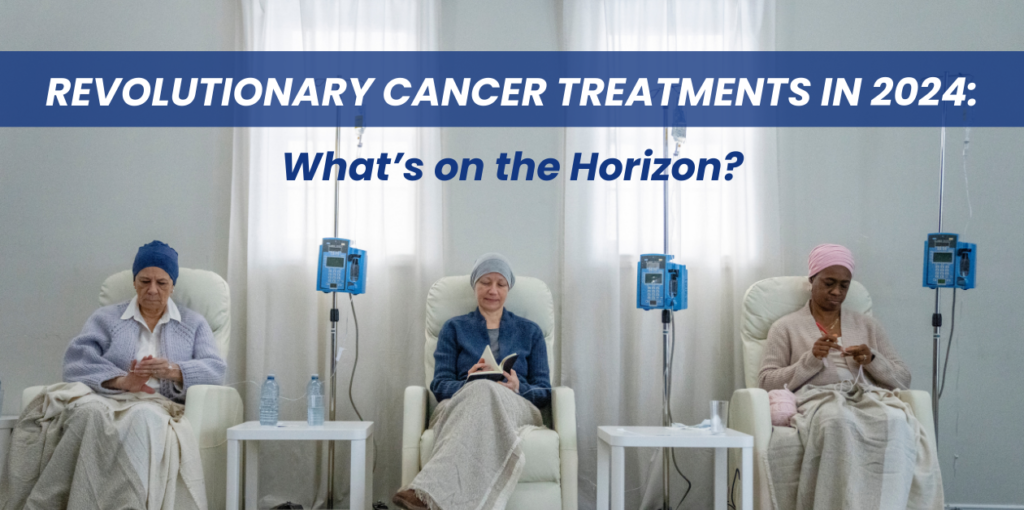Revolutionary Cancer Treatments in 2024: What’s on the Horizon?

Cancer treatment has made significant strides over the past few decades, bringing new hope to patients worldwide. As we step into 2024, the field of oncology continues to evolve with groundbreaking advancements. This blog explores the latest innovations in cancer treatment, focusing on immunotherapy, targeted therapies, and precision medicine, and how these developments are shaping the future of oncology.
Advancements in Immunotherapy
Immunotherapy has revolutionized cancer treatment by leveraging the body’s immune system to fight cancer cells. In 2024, several new developments have emerged, making immunotherapy more effective and accessible.
Personalized Cancer Vaccines
One of the most promising advancements is the development of personalized cancer vaccines. These vaccines are tailored to the unique genetic makeup of an individual’s tumor, enhancing the immune system’s ability to recognize and attack cancer cells. Clinical trials have shown promising results, with some patients experiencing long-term remission. Personalized vaccines work by identifying specific antigens present on cancer cells and training the immune system to target these antigens, leading to a more precise and effective immune response.
Checkpoint Inhibitors
Another significant breakthrough is the use of checkpoint inhibitors. These drugs block proteins that prevent the immune system from attacking cancer cells. In 2024, new checkpoint inhibitors have been approved, offering more options for patients with various types of cancer. Additionally, combination therapies that use multiple immunotherapy drugs are showing increased efficacy in treating stubborn tumors. For example, combining checkpoint inhibitors with other treatments like radiation or chemotherapy can enhance the overall effectiveness of the therapy.
CAR-T Cell Therapy
Chimeric Antigen Receptor (CAR) T-cell therapy is another innovative approach in immunotherapy. This treatment involves modifying a patient’s T-cells to express a receptor specific to cancer cells, enabling them to target and destroy the cancer. In 2024, advancements in CAR-T cell therapy are making it more effective and reducing side effects. Researchers are also exploring the use of CAR-T cells for solid tumors, which has traditionally been challenging.
Targeted Therapies
Targeted therapies have transformed the landscape of cancer treatment by focusing on specific molecules involved in cancer growth and progression. Unlike traditional chemotherapy, which affects both healthy and cancerous cells, targeted therapies aim to minimize damage to normal cells.
Bispecific Antibodies
In 2024, researchers have identified new molecular targets, leading to the development of innovative drugs. One such advancement is the use of bispecific antibodies. These antibodies can bind to two different targets simultaneously, enhancing their ability to destroy cancer cells. Clinical trials have demonstrated their effectiveness in treating cancers that were previously resistant to treatment. Bispecific antibodies work by bringing cancer cells and immune cells into close proximity, facilitating a more effective immune response.
CRISPR-Cas9 Gene Editing
Another exciting development is the use of CRISPR-Cas9 gene editing technology. This technology allows scientists to precisely edit the genes responsible for cancer growth. In 2024, several clinical trials are underway to test the safety and efficacy of CRISPR-based therapies. Early results are promising, with some patients showing significant tumor reduction. CRISPR technology offers the potential to correct genetic mutations that drive cancer, providing a more targeted and personalized approach to treatment.
Precision Medicine
Precision medicine is an approach that tailors treatment to the individual characteristics of each patient. By analyzing a patient’s genetic profile, doctors can identify the most effective treatments with the least side effects.
Genomic Sequencing and Liquid Biopsies
In 2024, precision medicine has become more sophisticated, thanks to advancements in genomic sequencing and data analysis. Liquid biopsies, which analyze cancer-related DNA fragments in the blood, are now widely used to monitor treatment response and detect early signs of relapse. This non-invasive technique allows for real-time adjustments to treatment plans, improving patient outcomes. Liquid biopsies offer a less invasive alternative to traditional tissue biopsies, making it easier to monitor disease progression and response to treatment.
Artificial Intelligence in Precision Medicine
Moreover, artificial intelligence (AI) is playing a crucial role in precision medicine. AI algorithms can analyze vast amounts of data to identify patterns and predict treatment responses. In 2024, AI-powered tools are helping oncologists make more informed decisions, leading to personalized treatment plans that maximize efficacy and minimize side effects. AI can integrate data from various sources, including genomic information, medical records, and clinical trials, to provide a comprehensive view of a patient’s condition and recommend the most effective treatment options.
Conclusion
The future of cancer treatment is bright, with groundbreaking advancements in immunotherapy, targeted therapies, and precision medicine. As we move forward in 2024, these innovations offer new hope to patients and their families. By continuing to invest in research and development, we can look forward to a world where cancer is no longer a life-threatening disease but a manageable condition. The integration of personalized approaches, cutting-edge technologies, and collaborative efforts in oncology research will pave the way for more effective and less invasive treatments, ultimately improving the quality of life for cancer patients.

Dr. A. Venugopal
Clinical Director & HOD Medical Oncology Senior Consultant Medical Oncologist & Hemato-Oncologist
About Author
Dr. A. Venugopal
MD (General Medicine), DM (Medical Oncology), MRCP – SCE Medical Oncology (UK), ECMO (Switzerland).
Dr A. Venugopal is One of the best medical oncologist and Hemato Oncologist in hyderabad, currently serving as the Head of the Department and Senior Medical Oncologist, Hemato Oncologist at Pi Health Cancer Hospital in Gachibowli, Hyderabad. He brings over 15 years of extensive experience in the field of Oncology.
